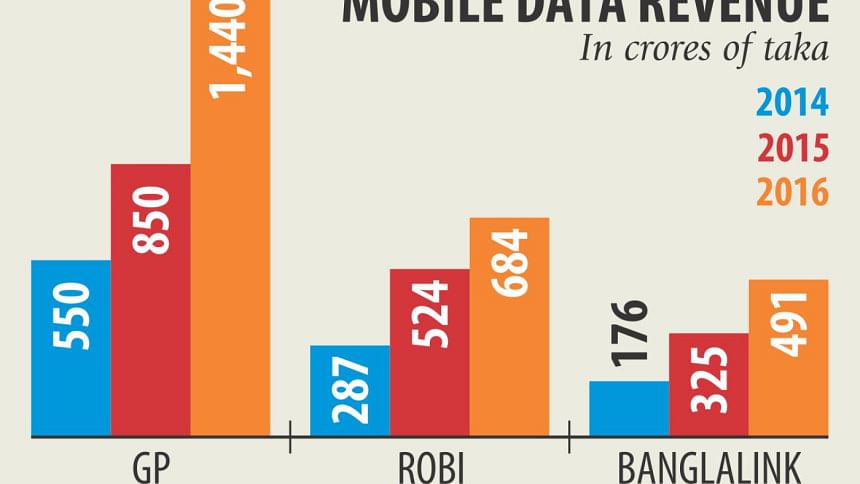Mobile internet emerging as a revenue churner

Data service is emerging as a solid revenue-generator for mobile operators following the launch of high-speed 3G network in the second half of 2013.
In 2016, the segment accounted for 12.5 percent of the revenues for Grameenphone, Robi and Banglalink -- the country's three leading operators who altogether have a market share of about 97 percent.
In 2015, data service fetched 8.32 percent of the three operators' revenues, up from 5 percent in 2014 and 2 percent in 2013.
"In our assessment, it will take 7 to 8 years for operators to earn more from data services than voice services," said Ekram Kabir, vice-president of Robi.
Kabir's comment echoes those of other operators.
"In the digital world of tomorrow, customers will use smartphones for their everyday chores, be it shopping or reading books and newspapers, listening to music or watching movies," said Asif Ahmed, head of corporate communications at Bangla-link.
Customers will have to consume more data to enjoy the digital benefits, he added.
Market leader Grameen-phone saw 77 percent year-on-year growth in data revenue in 2016 even though over 70 percent of its customers do not have 3G-enabled handsets.
The operator earned Tk 1,440 crore from mobile data services last year, which is 12.53 percent of its total revenue, according to its financial statement.
It earned Tk 850 crore and Tk 550 crore from data services in 2015 and 2014 respectively.
"The lack of 3G-enabled handsets is a barrier for further growth of data revenue," said Sayed Talat Kamal, Grameenphone's head of external communications.
To become a more data-centric operator, Grameenphone needs more spectrum and technology neutrality to launch 4G services, which would provide higher mobile internet speed.
With 4G, which is the fourth generation of wireless mobile telecom technology, operators can provide internet speed up to ten times faster than 3G.
Robi's data revenue soared 31 percent to Tk 684 crore in 2016, accounting for nearly 13 percent of the operator's total revenue.
The government needs to undertake various measures such as importing low-cost quality devices and slashing spectrum prices to take the data services to its optimum stage, it said.
Data intake depends on many factors such as device, good local content, overall digitisation of services and quality network.
"And here, the industry, the government and the regulators have to work together to ensure that affordable network can be established and content can be developed to meet the demand of the future generation," Kabir added.
Banglalink, the country's third largest operator, earned Tk 490 crore, or 10 percent of its total revenue, from data services last year. In 2015, it earned 6.9 percent of its revenue from the segment.
The operator saw a good number of its users switch from feature phones to smartphones in recent times.
"Thus, the consumption of data is increasing day by day. With the launch of 4G, data use will increase significantly," Ahmed of Banglalink said, adding that the operator has already made its SIM cards 4G compatible.
At the end of 2016, the number of mobile internet connections was more than 6.3 crore, up from 5.15 crore at the end of 2015.

 For all latest news, follow The Daily Star's Google News channel.
For all latest news, follow The Daily Star's Google News channel. 




Comments